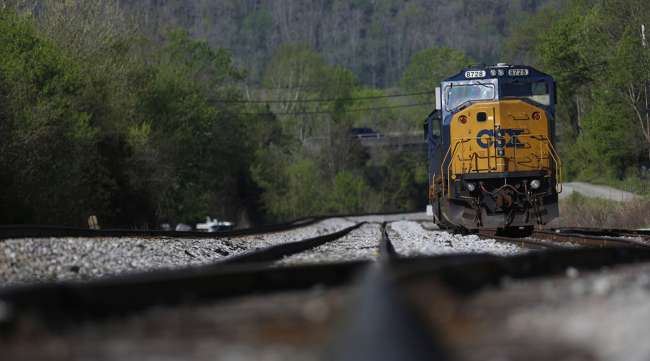Senior Reporter
Government Poised to Intervene in Freight Rail Fight

[Stay on top of transportation news: Get TTNews in your inbox.]
With a Dec. 9 deadline looming to reach an agreement on a nationwide freight rail contract, President Joe Biden is asking Congress to intervene in the dispute, which threatens to severely damage the U.S. economy.
“As a proud pro-labor president, I am reluctant to override the ratification procedures and the views of those who voted against the agreement,” the White House said in a statement. “But in this case — where the economic impact of a shutdown would hurt millions of other working people and families — I believe Congress must use its powers to adopt this deal.”
It is estimated that a strike would shut down 30% of the nation’s freight capacity.
Moments after Biden’s statement, House Speaker Nancy Pelosi (D-Calif.) announced that legislation would be taken up in an attempt to settle the dispute this week between 115,000 union workers and the management bargaining team. Affected carriers include CSX, Union Pacific, BNSF, Norfolk Southern and Kansas City Southern.

Pelosi
“This week, the House will take up a bill adopting the tentative agreement — with no poison pills or changes to the negotiated terms — and send it to the Senate,” the Speaker said. “It is my hope that this necessary, strike-averting legislation will earn a strongly bipartisan vote, giving America’s families confidence in our commitment to protecting their financial futures.”
The move comes after several customers and organizations that rely on the railroads urged Congress to get involved in the negotiations and impose a settlement, as it is legally allowed to do.
Even before the deadline, the American Chemistry Council warns the impact of the stalled labor negotiations could begin to be felt by the end of the week.
“We know from the chemical industry we will start feeling the impact before Dec. 9,” ACC Senior Director Jeffrey Sloan told Transport Topics. “There are certain products the railroads will embargo or hold because they are security-sensitive materials. They need to have those products either at the customer site or the shipper’s site or a secure location, if and when a shutdown happens, so the products aren’t stranded someplace they don’t need to be.”
ACC and other groups say Congress needs to intervene immediately and not let the contract deadline go down to the wire.

Jahn
Chris Jahn, CEO of ACC, said freight railroads move more than 33,000 carloads a week (nearly 4,800 a day) of critical chemicals used in various manufacturing and agricultural applications.
The council said that even in the unlikely event of a one-month strike, it would slam the brakes on the U.S. economy and send it into a recession. It would result in the loss of 700,000 jobs, spiking inflation and causing the Producer Price Index to increase by 4%, costing the economy 1% of gross domestic product growth and damaging the economy by almost $160 billion.
Natso, an organization that represents truck stops, said its sector would be damaged as gasoline and diesel supplies would be curtailed.

Neuman
A prolonged railroad shutdown will constrain the nation’s fuel supply by disrupting the availability of ethanol, which is often an essential component of gasoline, and diesel exhaust fluid, which most heavy-duty trucks need to run,” Natso Vice President of Public Affairs Tiffany Wlazlowski Neuman said in a statement. “Amid tight fuel supplies and low inventories, idled railcars stand to introduce a massive disruption in the availability of these additives, exposing the fuel market to a marked decrease in supply from which it would not be able to quickly adjust.”
Biden said his administration has been in regular contact with labor and management, but he sees little chance the deal can be resolved at the bargaining table.
A tentative agreement was reached in mid-September, just hours before a nationwide walkout could begin. Since then, eight of the 12 unions covered under the contract with the major freight carriers have ratified the agreement. Four have not, and if any one of the unions were to set up picket lines, the other unions said they would honor the strike.
The unions that have rejected the contract have said they are OK with the pay raises and other economic issues in the deal. However, they say the railroads have not improved their stance on the critical quality-of-life issues, including sick and personal time.
With a Dec. 9 strike deadline, railroads are planning to stop taking hazardous materials, including fuel, next week. With fuel and diesel in short supply throughout the country, we cannot afford any further disruptions. (2/3) — American Trucking (@TRUCKINGdotORG) November 29, 2022
Nearly 450 business groups, including American Trucking Associations, the U.S. Chamber of Commerce and the National Retail Federation, have urged the White House to seek congressional action.
“A potential rail strike only adds to the headwinds facing the U.S. economy,” they wrote.
A walkout also would affect some passenger rail services, including Amtrak, in several cities, including Chicago and Washington, where heavily traveled commuter lines lease the tracks from the freight rail carriers. Those tracks are maintained by union employees.
Want more news? Listen to today's daily briefing below or go here for more info:




